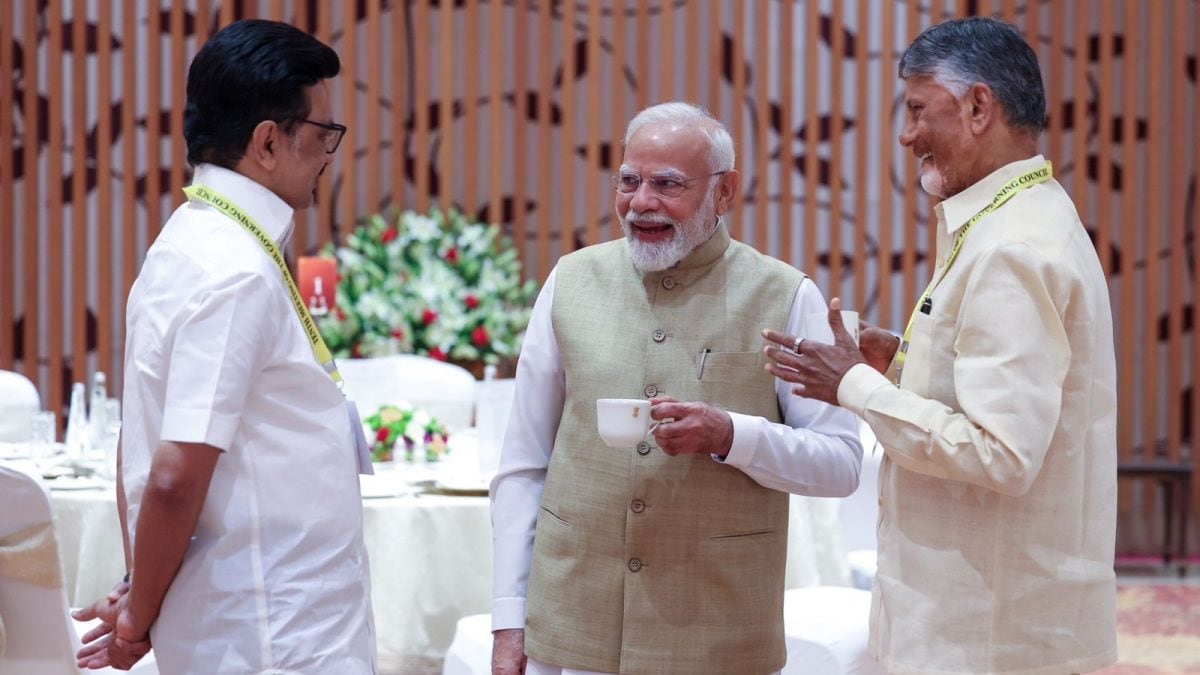 |
|
The 10th Governing Council meeting of NITI Aayog in Delhi on May 24, 2025, served as a notable platform for interaction between Prime Minister Narendra Modi and chief ministers from various states, including those governed by opposition parties. This interaction, documented through photographs and videos widely circulated on social media, highlights the significance of cooperative federalism in India's developmental agenda. The presence of key opposition figures such as Tamil Nadu Chief Minister M.K. Stalin, Punjab CM Bhagwant Mann, Jharkhand CM Hemant Soren, and Telangana CM Revanth Reddy underscores the potential for collaborative governance despite political differences. The meeting, however, was also marked by the absence of prominent southern opposition leaders, Karnataka CM Siddaramaiah and Kerala CM Pinarayi Vijayan, raising questions about the dynamics of regional participation in national policy discussions. The central theme of the meeting, 'Viksit Rajya for Viksit Bharat @2047', emphasized the role of developed states in driving the overall development of India by the year 2047. This vision necessitates a concerted effort from both the central government and the state governments, working together as 'Team India' to achieve ambitious developmental goals. The Prime Minister's emphasis on cooperative federalism and joint action reflects a strategic approach to leveraging the collective strengths of the nation. The NITI Aayog Governing Council, as the highest decision-making body, provides a crucial forum for fostering dialogue and consensus-building on critical policy issues. The inclusion of all chief ministers, lieutenant governors of Union Territories, and key Union ministers ensures broad representation and facilitates informed decision-making. The meeting also gains significance as it represents the first major interaction between the Prime Minister and chief ministers from across the country following Operation Sindoor, adding another layer of political context to the discussions. The event's focus on centre-state synergy suggests a renewed commitment to collaborative governance, which is essential for realizing the vision of a developed India. The challenges of balancing national priorities with regional aspirations require careful negotiation and mutual understanding. The NITI Aayog platform offers an opportunity to address these challenges through open dialogue and collaborative problem-solving. The success of the 'Viksit Bharat' vision hinges on the effective implementation of policies at the state level, requiring strong coordination and support from the central government. The interactions at the meeting, captured in images of Prime Minister Modi engaging with various chief ministers, symbolize the spirit of cooperation and the potential for unified action. However, the absence of certain key figures also serves as a reminder of the existing political complexities and the need for ongoing efforts to bridge divides and foster inclusivity. The focus on developed states driving national development highlights the importance of equitable growth and regional parity. Addressing disparities in development levels across different states is crucial for ensuring that all regions contribute effectively to the 'Viksit Bharat' vision. The NITI Aayog meeting provides a platform for sharing best practices and identifying strategies for accelerating development in less developed regions. The emphasis on joint action between the Centre and the states underscores the need for a coordinated approach to policy implementation. This requires effective communication, shared responsibility, and a commitment to mutual support. The success of cooperative federalism depends on the ability of the central government and the state governments to work together in a spirit of trust and collaboration. The challenges of achieving the 'Viksit Bharat' vision by 2047 are significant, requiring sustained efforts and a long-term commitment to development. The NITI Aayog meeting serves as a reminder of the importance of collaborative governance and the need for ongoing dialogue and cooperation between the Centre and the states. The event underscores the importance of inclusive growth and the need to address regional disparities. It also highlights the role of NITI Aayog in fostering dialogue and consensus-building on critical policy issues. The absence of some CMs however also highlighted political tensions and the challenges of achieving full participation from all states and regions.
Source: From MK Stalin To Revanth Reddy: PM Modi Shares Smiles With INDIA Bloc CMs At NITI Meet
